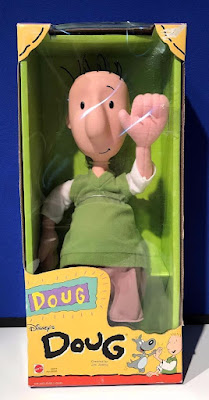In the entertainment business, cartoon characters are treated as real celebrities and public figures with full careers and accolades to match.
When Doug Funnie was 11 years of age he became the star of his own television series self-titled Doug. The relatability, coming-of-age narrative, quirky imagination, catchphrases, social commentary, spin-offs, and merchandise all contributed to the success of the show and his significance in pop culture. He has had an interesting rise to fame and career in the entertainment industry.
The year was 1991 and the show premiered on Nickelodeon on August 11 alongside Rugrats and The Ren & Stimpy Show as the channel's first original animated content known as Nicktoons. The history making debut made Doug an television icon and a breakout star of the '90s.
Executive produced by Jim Jinkins under the Jumbo Pictures production company, the shows pilot Doug Can't Dance, proved to be a big hit with executives at Nickelodeon and the rest is history.
Doug was As Told By Ginger before As Told By Ginger was As Told By Ginger. Doug himself narrates each story in his journal as a recurring theme in the series. The show also incorporates many imagination sequences along with addressing numerous topics, including trying to fit in, platonic and romantic relationships, self-esteem, bullying, and rumors.
The show went on to be nominated for two Daytime Emmy Awards by the time the show ended it's 4th season in 1994.
The original run consisted of 52 episodes over four seasons that were broadcast from 1991 to 1994. Nickelodeon opted against renewing the show for a fifth season.
In turn, The Walt Disney Company purchased ABC while also purchasing Doug in a multimillion-dollar deal in 1996. The deal involved buying Jumbo Pictures and "signing them to five-year contracts, with stock options, to be Disney executives." The company also purchased the Doug trademark and its rights to all future merchandising. Nickelodeon was allowed to retain the rights to the episodes produced from 1991–1994. Viacom’s chairman at the time, Sumner Redstone, wasn’t happy to that Walt Disney had acquired the show.
Many original staff members of Doug regard the Disney run as inferior to the Nickelodeon run. With Disney, the show moved to ABC's Saturday morning programming block lineup for three more seasons, where it became a top-rated show, inspiring books, merchandise and a live stage musical. In its first season, the renamed “Brand Spanking New Doug” series (since called Disney’s Doug) became the block's cornerstone. In its second season, it’s a key contributor to making the network No. 1 in Saturday morning ratings.
The show's last episode aired in June of 1999 after 7 seasons being nominated for two more Daytime Emmy Awards and a theatrical feature, Doug's 1st Movie, released as the series' conclusion. It was predicted that if the movie was a success, the Doug franchise could be worth more than $100 million to Disney. However, this did not happen. With a budget of five million, the film underperformed previous expectations grossing less than twenty million at the box office.
Douglas Yancey Funnie's birthday is said to be on August 22, 1981. Depending on the year you are reading this article, you do the math on how old he is!
He's come a long way from portraying his alter-ego's Quailman and Smash Adams. His hit series currently is available via on demand services such as Apple TV (as well as the Disney version), Amazon Prime Video and Paramount+, while the Disney run episodes and Doug's 1st Movie are on the Disney+ streaming app.
Doug Funnie was significant to pop culture in several ways:
- 1. Relatable Everyman: Mr. Funnie was an ordinary, relatable character who faced everyday challenges and experiences that many viewers could identify with. He dealt with issues such as school, friendships, crushes, and family dynamics, making him a relatable figure for young audiences.
- 2. Coming-of-Age Story: The show followed Doug's journey from middle school to high school, capturing the ups and downs of adolescence. This coming-of-age narrative resonated with viewers who were going through similar transitions in their own lives.
- 3. Quirky Imagination: Doug was known for his vivid imagination, often daydreaming and creating elaborate fantasies to escape reality. This aspect of his character added a whimsical and creative element to the show, appealing to viewers' imaginations.
- 4. Iconic Catchphrases: Doug Funnie popularized several catchphrases that became part of pop culture, such as "I'm a loser," "Bangin' on a trashcan," and "Honker Burger." These phrases became widely recognized and referenced by fans of the show.
- 5. Social Commentary: "Doug" tackled various social issues and themes, including bullying, peer pressure, environmentalism, and cultural diversity. The show's ability to address these topics in a relatable and accessible way made it significant in promoting awareness and understanding among young viewers.
- 6. Spin-Offs and Merchandise: The popularity of Doug Funnie led to the creation of spin-off shows, such as "Disney's Doug" and "Brand Spanking New! Doug." Additionally, the character's image was featured on various merchandise, including toys, clothing, and video games, further solidifying his impact on pop culture.
In May 2023 on an episode of the All Grown Up (SYKE)! podcast with Tenn Buick, the show's creator Jim Jinkins stated that a sequel to the Doug series was in the early works at Disney+ and would focus on the kids of Doug and Patti Mayonnaise.






No comments:
Post a Comment